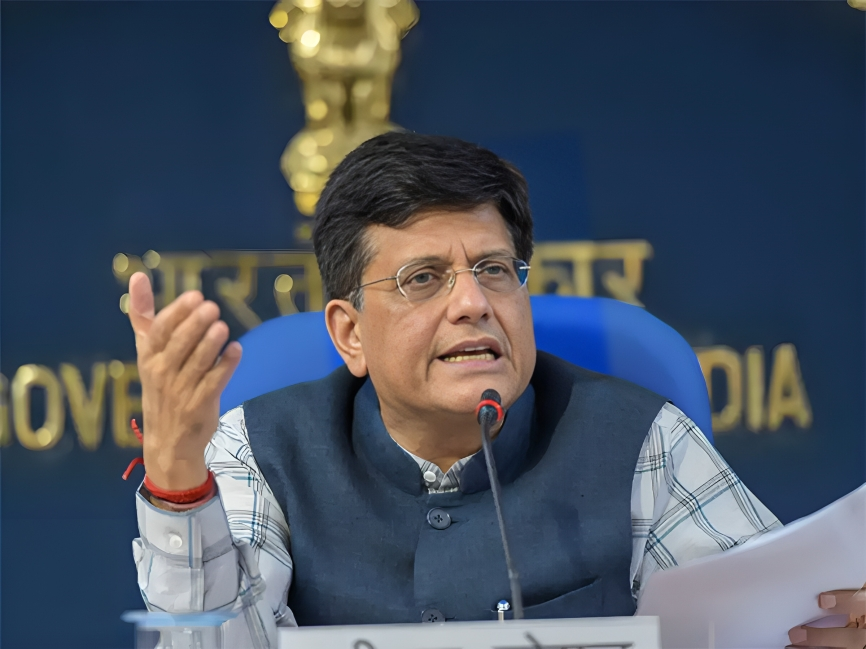India’s firm stand at WTO Ministerial Negotiations
Despite pressures, particularly from developed nations to reduce domestic support on agriculture and allowing them easy market access for their farm produce, India prevailed upon the lobby at the Abu Dhabi Ministerial Conference (MC13) of WTO, which was concluded on March 2, 2024 with two days of extension from the scheduled closing date of February 29

Image Source: BW BusinessWorld
The Abu Dhabi Ministerial Conference (MC13) of the World Trade Organization (WTO), which concluded on March 2, 2024, was a period of intense negotiation. Despite significant pressures from developed nations to decrease domestic support for agriculture and to provide them with easy market access for their farm produce, India managed to stand firm. This was a significant achievement, given that the conference had to be extended by two days from the originally scheduled closing date of February 29.
The credit for this success largely goes to Commerce Minister Piyush Goyal. His ability to withstand such international pressures, and to prioritize the protection of Indian agriculture and the interests of Indian farmers, was instrumental. India faced criticism from global powers for taking such a rigid position. This criticism was reflected in a report by international news agency Reuters, which quoted European Commission Executive Vice President and Trade Commissioner Valdis Dombrovskis. According to the report, Dombrovskis expressed disappointment over the lack of consensus on fisheries, agriculture, and broader reforms, and singled out India for blame. While his frustration is understandable, India could not afford to sacrifice its national interest to build a global consensus that would ultimately have benefitted developed nations over developing ones.
India today is a vastly different country both politically and economically than it was around a decade ago. Back in the day, it agreed to allow a ‘peace clause’, a crucial provision for India to support its farmers through schemes like the Minimum Support Price (MSP). This agreement was made at the Ninth Ministerial Conference (MC9) in Bali in December 2013. Members agreed that the ‘peace clause’ was an interim solution to public stockholding (PS) for food security purposes and that a permanent solution would be found by 2017 (the 11th Ministerial Conference or MC11).
However, had the Modi government not intervened immediately after assuming power in May 2014, India would find it difficult, if not impossible, to run its MSP program, which is crucial for Indian farmers. It was reported extensively that during the MC13 (February 26 to March 2, 2024), agriculture was the top priority of both India and Europe. Farmers in Europe were protesting over issues such as subsidies and market access. For India and its partners (almost 80 countries), negotiations related to public stockholding (PSH) for food security were the most critical aspect of agriculture.
PSH is of key importance for two reasons – first, it involves procurement of food grains from farmers assuring them MSP for their produce if market prices fall; and second, grains are procured to provide free dry ration to over 810 million poor under the Prime Minister Garib Kalyan Ann Yojana (PMGKAY), besides fulfilling the obligation to distribute highly subsidised food items under the National Food Security Act (NFSA).
WTO rules limit the subsidy that can be provided to such farm products being procured. The G-33 — a coalition of developing countries including India and African groups, over 80 countries in total – is demanding a permanent solution to PSH for food security purposes while improving the ministerial decision adopted at the ninth ministerial conference (MC9) in Bali in December 2013.
The then commerce minister (current finance minister) Nirmala Sitharaman played a crucial role in protecting India’s interests. If not for her efforts, India would have lost the shield of the ‘peace clause’ which by MC9 of Bali was to expire in 2017. She informed the Parliament that India had decided not to join the consensus in the WTO on the implementation of the Trade Facilitation Agreement till our concerns relating to the implementation of other Bali Ministerial Decisions, in particular, the Decision on Public Stockholding for Food Security Purposes, were addressed.
After a firm stand taken by Sitharaman on this matter at the WTO, its general counsel (GC) in November 2014 extended the peace clause in perpetuity until a permanent solution is agreed upon and adopted. The MC10 at Nairobi endorsed the GC decision. However, no outcome was achieved on this matter in subsequent ministerial meetings (MC11 in Buenos Aires and MC12 in Geneva). Hence, Indian farmers remained protected even after MC13 at Abu Dhabi failed to resolve issues about agriculture.
Team Profile

- News Writer
- Shubham Chakraborty, a Freelance Writer, holds an MBA from XLRI and boasts 6.5 years of extensive corporate experience. Departing from his corporate path, he embarked on a journey to fulfill his childhood dream of focusing on writing.
Latest entries
 English12 May 2024US Likely to Impose 100% Tariff on Electric Vehicle Imports from China
English12 May 2024US Likely to Impose 100% Tariff on Electric Vehicle Imports from China English26 March 2024UN Security Council Demands Immediate Ceasefire for the First Time Amidst Ongoing Israel-Gaza Conflict
English26 March 2024UN Security Council Demands Immediate Ceasefire for the First Time Amidst Ongoing Israel-Gaza Conflict English23 March 2024Bloodbath in Moscow: ISIS-K Delivers Shocking Blow to Heart of Russia
English23 March 2024Bloodbath in Moscow: ISIS-K Delivers Shocking Blow to Heart of Russia English20 March 2024A Hollow Victory: Putin Claims Landslide in Russian Election and Scorns US Democracy
English20 March 2024A Hollow Victory: Putin Claims Landslide in Russian Election and Scorns US Democracy









